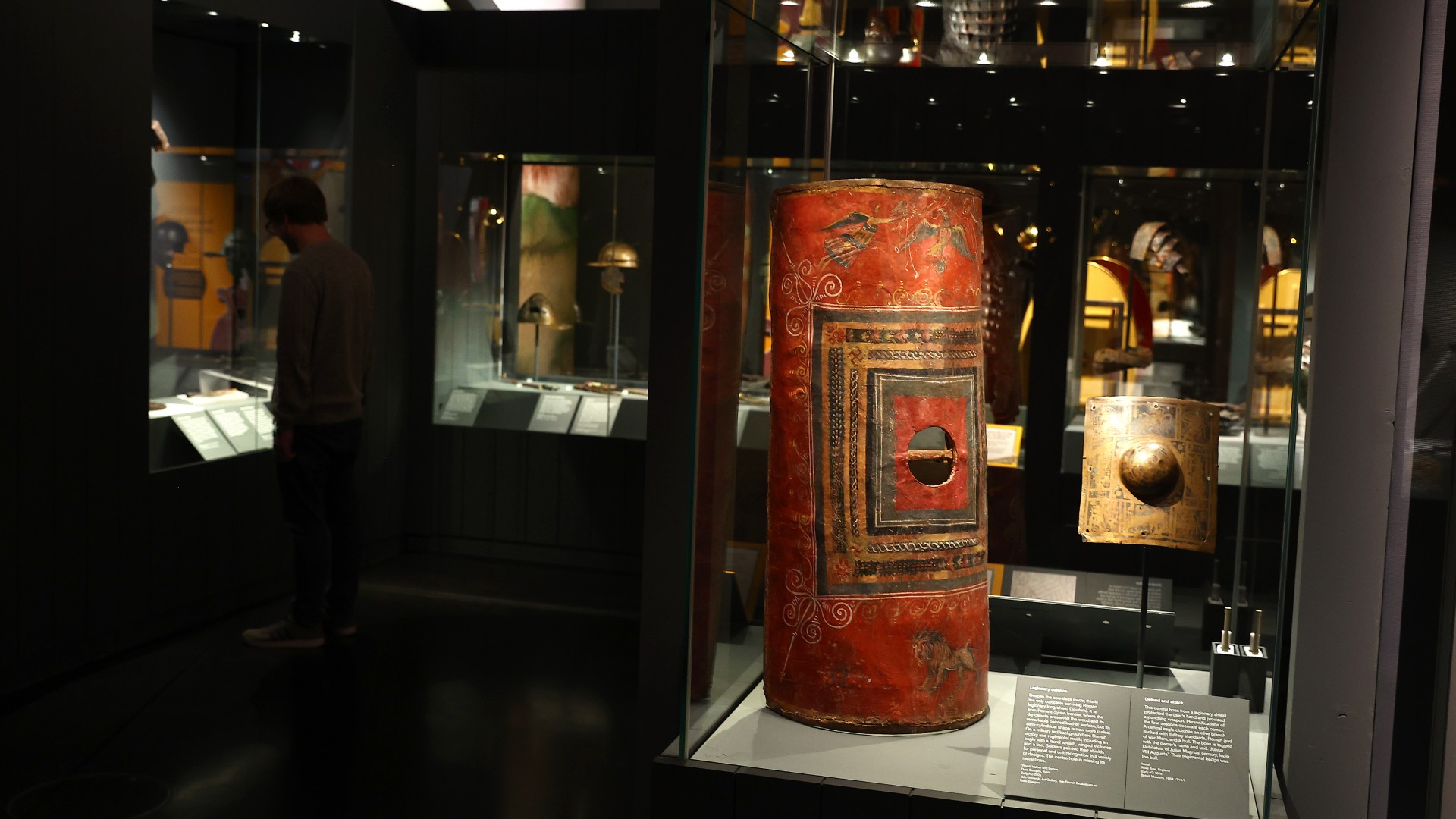Legion: life in the Roman army – one of 'the most powerful' British Museum exhibitions
This 'gripping' new exhibition explores how Rome built its vast empire 'on military might'

A free daily email with the biggest news stories of the day – and the best features from TheWeek.com
You are now subscribed
Your newsletter sign-up was successful
At its peak, the Roman empire numbered some 60 million inhabitants and controlled everything "from Mesopotamia all the way to Hadrian's Wall", said Nick Clark in the Evening Standard.
Stationed across it was a force of 300,000 soldiers (small by modern standards, but one of the largest ancient standing armies). It was tasked with defending borders, policing, and putting down rebellions. The job was dangerous: once a soldier began his 25-year term of service, "medical discharge, dishonour, retirement or death were the only exit routes" – and recruits had just "a 50% chance of making it to retirement".
This "gripping" new exhibition explores how Rome built its vast empire "on military might", investigating what life was really like "for recruits at the sharp end of this fearsome war machine". Bringing together some genuinely "spine-tingling" exhibits, including clothing, weapons, and letters between soldiers and their families, it spans centuries and tells some "staggering stories".
The Week
Escape your echo chamber. Get the facts behind the news, plus analysis from multiple perspectives.

Sign up for The Week's Free Newsletters
From our morning news briefing to a weekly Good News Newsletter, get the best of The Week delivered directly to your inbox.
From our morning news briefing to a weekly Good News Newsletter, get the best of The Week delivered directly to your inbox.
All in all, it is a "breathtaking and exhaustive" look at "how soldiers, from lowly auxiliaries to the high-ranked centurions, joined up, fought, played, loved and died".
The exhibition introduces its subject through the eyes of Claudius Terentianus, a soldier from Egypt at the time of emperor Trajan, said Laura Freeman in The Times. His papyrus letters home, found at Karanis in Egypt, give us "glimpses of this young man's life": after "a failed attempt" to join the legions, he enlisted in the "poorer-paid" marines and was sent east, probably to fight the Parthians.
The "scant story" is brought to life with extraordinary artefacts from every corner of the empire. A single red sock accompanies a letter he sent "begging his father to send better sandals" and a pair of felt socks. We see "a case of nit combs" – then as now, lice were unavoidable in the ranks – and even "an exquisite little travel toilet set" complete with "tweezers, ear scoop and nail cleaners".
This is not "the prettiest of shows". Its palette – "a moody mix of rust, iron, blackened leather and stone" – may leave some craving a bit of colour. But it's a "muscular" and "moving" exhibition.
A free daily email with the biggest news stories of the day – and the best features from TheWeek.com
The "darkness" of military life is never overlooked, said Alastair Sooke in The Daily Telegraph. "Twisted human remains" – including the skeleton of "one poor, crucified soul" – abound, while "a perforated ox's skull used for target practice" demonstrates the power of Roman artillery bolts.
Yet narrative detail lightens the mood. Troops, we learn, hailed from all over the empire, with some ethnicities more prized than others. North African horsemen were particularly valued; recruits from our own "rain-sodden province" less so. We learn that the Romans referred to us as "Brittunculi", or "wretched little Brits". "Indelible" details of this sort make Legion one of "the most powerful" British Museum exhibitions in living memory.
-
 How the FCC’s ‘equal time’ rule works
How the FCC’s ‘equal time’ rule worksIn the Spotlight The law is at the heart of the Colbert-CBS conflict
-
 What is the endgame in the DHS shutdown?
What is the endgame in the DHS shutdown?Today’s Big Question Democrats want to rein in ICE’s immigration crackdown
-
 ‘Poor time management isn’t just an inconvenience’
‘Poor time management isn’t just an inconvenience’Instant Opinion Opinion, comment and editorials of the day
-
 Bad Bunny’s Super Bowl: A win for unity
Bad Bunny’s Super Bowl: A win for unityFeature The global superstar's halftime show was a celebration for everyone to enjoy
-
 Book reviews: ‘Bonfire of the Murdochs’ and ‘The Typewriter and the Guillotine’
Book reviews: ‘Bonfire of the Murdochs’ and ‘The Typewriter and the Guillotine’Feature New insights into the Murdoch family’s turmoil and a renowned journalist’s time in pre-World War II Paris
-
 6 exquisite homes with vast acreage
6 exquisite homes with vast acreageFeature Featuring an off-the-grid contemporary home in New Mexico and lakefront farmhouse in Massachusetts
-
 Film reviews: ‘Wuthering Heights,’ ‘Good Luck, Have Fun, Don’t Die,’ and ‘Sirat’
Film reviews: ‘Wuthering Heights,’ ‘Good Luck, Have Fun, Don’t Die,’ and ‘Sirat’Feature An inconvenient love torments a would-be couple, a gonzo time traveler seeks to save humanity from AI, and a father’s desperate search goes deeply sideways
-
 A thrilling foodie city in northern Japan
A thrilling foodie city in northern JapanThe Week Recommends The food scene here is ‘unspoilt’ and ‘fun’
-
 Tourangelle-style pork with prunes recipe
Tourangelle-style pork with prunes recipeThe Week Recommends This traditional, rustic dish is a French classic
-
 Samurai: a ‘blockbuster’ display of Japan’s legendary warriors
Samurai: a ‘blockbuster’ display of Japan’s legendary warriorsThe Week Recommends British Museum show offers a ‘scintillating journey’ through ‘a world of gore, power and artistic beauty’
-
 BMW iX3: a ‘revolution’ for the German car brand
BMW iX3: a ‘revolution’ for the German car brandThe Week Recommends The electric SUV promises a ‘great balance between ride comfort and driving fun’